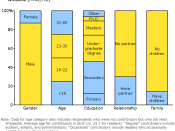Research Strategies p. 319 - 334
- establish central purpose and research needs
- start on time and work on a regular basis
- read and consult widely; move from the general to the specific
- constantly work with a teacher/librarian and record comments in a research folder
- review print and online encyclopedias for a general overview and framework
- use all kinds of databases for your research; move to interviews, surveys, e-mail
- consult and conference with teachers, librarians, peers to resolve and clarify research issues
Research Resources
Human Resources
- people informed and interested in the research work
- The teacher/instructor: ongoing conference guides your work, informs about the sources available, spot errors
- The teacher-librarian and librarian: most informed expert, consults for available resources, search strategies, hands-on training using technology
- Other school-based sources: IT technicians, laboratory assistants, teachers in related subject area
- Community: locate people through library, newspapers, television, radio, Yellow Pages, Internet.
The sources can be government departments or agencies, clubs, associations, service groups, interest/pressure groups, educational institutions (schools, libraries, museums, archives)
Multimedia Sources
- Print: books (fiction/non-fiction); handbooks, journals; general and specific topic studies; specialized reference materials, atlases, encyclopedias, biographical dictionaries, yearbooks, indexes, gov't catalogues, microfilm, maps, photos, statistics, tapes interviews; periodicals and newspapers, information files
- Technology: Internet, hyperlinks, web sites, online database and encyclopedias; CD-ROMs; video and laser disks; cameras, videocams; interactive television; audiotapes and disks
- Other Media: films and videos + catalogues; filmstrips, audiovisual kits; overheads; television and radio broadcasts, archives, Web sites
Interviews and Surveys
- relying on listening skills
Active/Passive Listening
Passive: - remaining quiet and inattentive, daydreaming and doodling, shifting in seat, little eye contact with the speaker, no strategy to record or remember what is said
Active: - maintaining eye contact, focusing...


